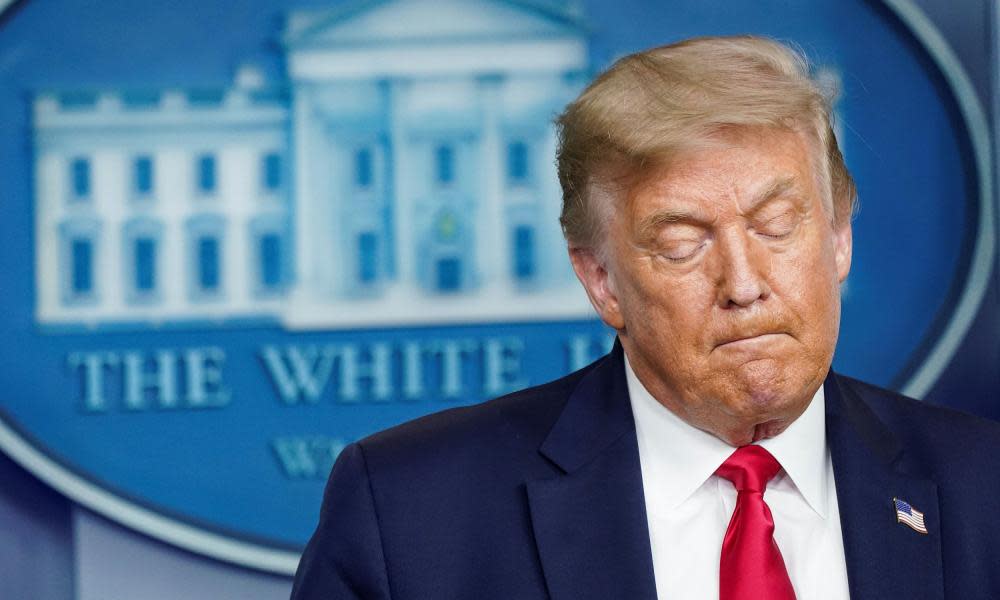Trump's free-speech legal folly has merely emboldened his critics

Donald Trump always had a problem with free speech. Back in the day, he sued reporter Tim O’Brien and the New York Times for allegedly underestimating his wealth. Trump claimed that he was worth billions, but O’Brien pegged the number at no more than $250m, not shoddy but also not jaw-dropping. In the end, New Jersey’s courts tossed Trump’s libel claim, but only after the tabloid star acknowledged that his personal balance sheet was influenced by his own guesstimates.
Time passes and some things don’t change. Trump remains censorious as ever while the courts continue to deny him the relief he ultimately seeks – free media that fawns and flatters but does not actually hold him to account.
On Thursday, a federal judge sitting in Manhattan delivered yet another reminder that the Bill of Rights secures free speech. This time, the court also made clear that the federal prison system was not created to silence Trump’s adversaries. In other words, two divorces and three wives do not make him Henry VIII.
The court also made clear that the federal prison system was not created to silence Trump’s adversaries
Judge Alvin Hellerstein ordered Michael Cohen released from federal prison after finding that the administration had sought to illegally muzzle Trump’s one-time consigliere. Cohen had been furloughed to home confinement on account of Covid-19, but was then sent back to jail after refusing to shut up about his about his former boss in an upcoming book.
Hellerstein, an 86-year-old Clinton appointee, remarked that this was the first time he had seen this kind of power play by the government in more than 20 years on the bench. He described the administration’s stance this way: “You toe the line about giving up your first amendment rights or we’ll send you to jail.” Hellerstein also found the government’s conduct to be impermissibly retaliatory.
From the sound of things, the 45th president has more in common with Tony Soprano than with his immediate predecessors. But by now, that is not exactly news.
Adding insult to injury, this was Trump’s third defeat in as many attempts to mute a critical author. First, Bill Barr’s justice department failed to obtain a pre-publication injunction against John Bolton, Trump’s one-time national security adviser, and his book, The Room Where It Happened. Then Trump’s brother, Robert, unsuccessfully sought to prevent Mary Trump, their niece, and Too Much and Never Enough, her family tell-all, from being heard or seeing the light of day. In baseball, commentators would say that he struck out swinging.
In its opinion, the court cited the Pentagon Papers case as grounds for refusing to enjoin publication, and in a rhetorical flourish added, “in the vernacular of first-year law students, ‘constitutional law trumps contracts’”. In other words, non-disclosure agreements take a back seat to free speech and the public’s right to know. And now this.
Even worse for Trump, his legal flailing has resulted in paydays for his critics. Lawsuits are free publicity and goose book sales. Said differently, Brad Parscale, the president’s ex-campaign manager, is not the only person to make a buck off the Trump name.
Related: Judge orders Michael Cohen's prison release after government 'retaliation'
In January 2018, Trump threatened to block Michael Wolff from releasing Fire and Fury but never actually went to court. Trump’s aborted gambit caused Wolff’s publishers to release the book early, and it became an overnight sensation. Instead of Trump intimidating his intended targets, he only emboldened and enriched them.
As for Bolton, The Room Where it Happened is on its fourth week on the bestsellers’ list after it debuted at No 1. Mary Trump’s Too Much and Never Enough sold nearly a million copies in its first week. Talk about unintended consequences.
Suffice to say, when it comes to free speech, Trump has been inconsistent. In a recent interview with CBS, Trump made clear that the first amendment protects the display of the Confederate battle flag. He explained: “My attitude is freedom of speech. Very strong views on the Confederate flag. With me, it’s freedom of speech. Very simple. Like it, don’t like it, it’s freedom of speech.”
But with this president few things are ever that simple. And even fewer are true.

 Yahoo News
Yahoo News 
